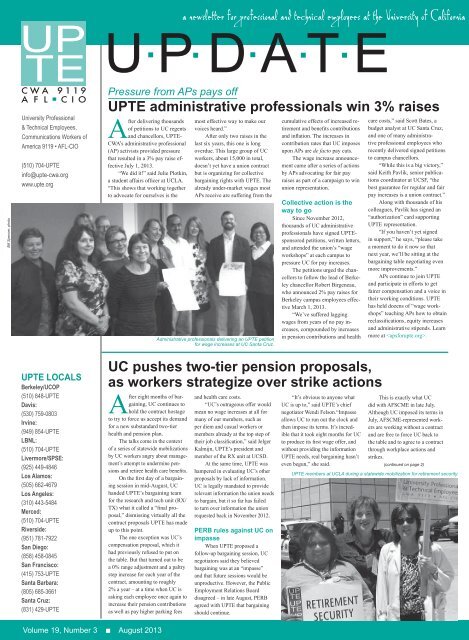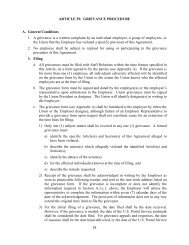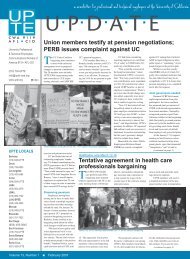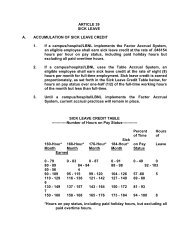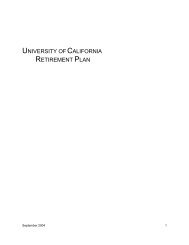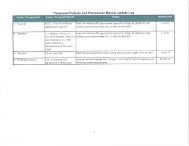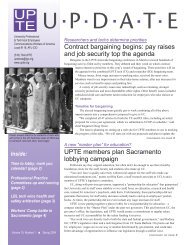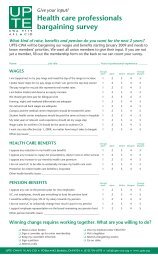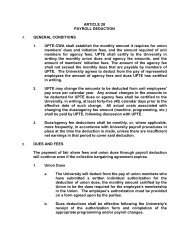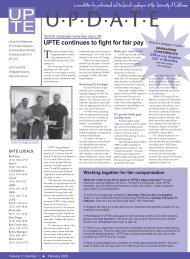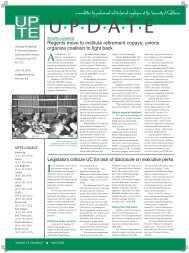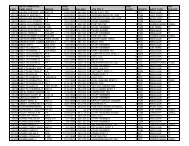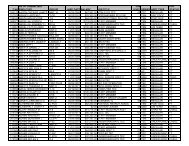UPDATE Newsletter - UPTE-CWA 9119
UPDATE Newsletter - UPTE-CWA 9119
UPDATE Newsletter - UPTE-CWA 9119
You also want an ePaper? Increase the reach of your titles
YUMPU automatically turns print PDFs into web optimized ePapers that Google loves.
Organizing for fairnessAt right, <strong>UPTE</strong> members at UC Davisjoined colleagues around the state onJuly 1 to protest the imposition of twotierpost-employment benefits (pensionand retiree health care). While UC canunilaterally impose these changes onthose without a union contract, it mustnegotiate with those whohave contracts.<strong>UPTE</strong>-<strong>CWA</strong> has with joined the CaliforniaNurses Association to stand for fairpay and retirement security for all, ratherthan UC’s race to the bottom.“We insist there are alternative meansto stabilize the retirement fund and ourretiree health benefits, which keep allemployees on the same plan,” saidJelger Kalmijn, <strong>UPTE</strong>’s president and astaff research associate at UCSD.“Modest contributions from all ofus can easily avoid future pay,retirement or benefits cuts.”Ergo tip: hand-held devicesDon’t hold themcontinuously, or limituse!Holding a small device creates muscletension even before you use it for morethan a few minutes. Find a holder,stand, and/or keyboard add-on that letsyou use the device without awkwardpostures and muscle strain; alternatively,use the device for short periodsof time or with speech recognition.Resource: Administrative professional activist RanaBurroughs (left) delivering a letter signed byunion members thanking Berkeley’s chancellorfor his positive response to <strong>UPTE</strong>’s wage petition.HX workers head to fact-findingSince <strong>UPTE</strong>-<strong>CWA</strong>’s health care professionals(HX) unit has been at impassein the bargaining process, two mediatedsessions have been held this summer.“As many already know, the issue that<strong>UPTE</strong> cannot agree to is UC’s proposal fora two-tier pension plan and reduced retireehealth care for many of our members as wellas new hires into the unit,” said <strong>UPTE</strong>’schief bargainer, Wendi Felson.“These sessions are facilitated by aprofessional mediator whose role is totry to get the two sides to overcome theirobstacles and reach some agreement,” saidFelson. “These mediated bargaining sessionsare confidential, so we have not publishedbargaining reports as we usually do after ourmeetings with UCOP’s team. While <strong>UPTE</strong>’sHX team was hopeful that the mediatorcould bring UC back to real negotiationswith us, it didn’t happen,” she added.For more information on the pensionand health care changes, and to use the onlinecalculator to determine what your costswould be if <strong>UPTE</strong> accepted UC’s proposal,go to .Proceeding to fact-findingThe negotiators have now officiallybeen released by the mediator to the nextstep in the impasse process. That is “factfinding,”which involves both sides presentingtheir bargaining proposals, supportingdocuments, andwitnesses to a panelof three. The panelis made up of one<strong>UPTE</strong>- appointedmember, one UCappointedmemberand one PERBapprovedmemberwho has beenagreed upon by both parties.The goal is to present the best case as to whyour proposals are reasonable and fair. Thisis the step that the HX unit has just completed.Once the fact-finding hearing has takenplace, the panel will make a report based onwhat both parties have presented as to whatthey feel are the most reasonable proposals.Once the report is made, each side mustcome back to the negotiating table one moretime. If there still is no resolution, thenthere is a 10-day “cooling off” period. Atthat point, the report findings can be madepublic by either side. UC can then imposetheir final offer on the HX unit for one yearand the HX unit has the right to strike.“If we should get to the point where wefeel striking is our only option,” said Felson,“we have several other <strong>UPTE</strong> units andother UC unions who are in a position to goon a sympathy strike with HX.”<strong>UPTE</strong> is currently circulating strikepledge cards. Your elected HX bargainingteam urges you to contact your <strong>UPTE</strong> localand sign one, if you have not yet done so.Creating a saferworkplace with unionbasedtrainingA major conundrum in health and safetytraining is how to convince workers of theneed for training, or why they would benefitfrom additional training. Workers tend tobecome interested in health and safety onlyafter they or a coworker have suffered apreventable injury or illness (or worse).Most UC training is web-based, thougheven top UC safety managers agree thathands-on training is far moreeffective. Webbasedtraining is afast and relativelyinexpensive wayto meet the university’slegal obligationsto providetraining.Union-basedhealth and safetytraining uses worker- trainers, as well as asmall-group activity method that is participatoryand engaging. Its primary goal isbroader and more comprehensive than teachingworkers how to identify, understand, andavoid exposure to hazards.Ultimately, union-based health andCHECK YOUR PAYSTUB!Is UC deducting more for your retirement?If so, that’s illegal if you are in the HX, TX orRX units. These <strong>UPTE</strong>-representedemployees are still in bargaining overpensions, wages and other matters. UC cannotmake changes for anyone in these units.Contact your local if you see a change.safety training focuses on workers’ “role inremoving or controlling hazards” by teaching“how to engage effectively in collective action... to end working conditions and exposuresthat increase their risk of suffering injury,illness, and even death from their jobs,” writeDeborah Weinstock and Craig Slatin in “Learningto Take Action: the Goals of Health andSafety Training,” New Solutions 22(3), 2012.It will take involved union members toestablish effective health and safety trainingin an academic system in which top managementis arrogant and maintaining its control isparamount, and principal investigators oftenare given undue deference (even if they’ve hadno safety training). In addition, Environment,Health and Safety departments lack sufficientauthority to challenge them; top managementgags and reins in lower-level managers (likeEH&S directors) so they can’t talk to unionmembers or plan effective actions that mightchallenge UC’s hierarchy; and increasingamounts of money and control are movingfrom the bottom to the top.If you want a voice in collective action tomake UC a safer place to work, contact your<strong>UPTE</strong> local about participating in a multiunionhealth and safety training being plannedfor spring. – Joan Lichterman, <strong>UPTE</strong>’s health& safety directorRX/TX bargaining(continued from page 1)Sticking points with UC include wages,pensions and retiree health. UC is demanding<strong>UPTE</strong>-represented workers accept its two-tierpension plan, which would permanently lowerbenefits and push back retirement age for allnew employees hired after July 1, 2013, andabout half of current employees.UC’s proposal claims to respond toalleged financial liabilities of the pensionplan, but a professional actuarial firm, hiredby <strong>UPTE</strong> and other campus unions, revealedthat UC’s plan is based on faulty assumptions.<strong>UPTE</strong> has held strong against UC’s pressure,contending that there are effective ways toresolve any issues without creating a secondclasssystem. Learn more at .2 | <strong>UPDATE</strong>
Around the stateHow do your wages compare tosimilar positions outside UC?If there’s one thing administrative professionals(APs) at UC have in commonwith many other workers at UC, it’scrummy pay. The university’s 15,000 APsare organizing with <strong>UPTE</strong> for a voice at thebargaining table to change that.Among more than a thousand respondentsto <strong>UPTE</strong>’s recent survey, more than75% said their paychecks are lower than theywould be at comparable jobs outside UC.That’s not surprising: According toMIT’s Living Wage Calculator, a familyof four needs to earn $46,072 just to meetbasic expenses in California. In high-costareas, the numbers are much higher – nearly$53,000 for those in or near San Francisco.UC used to support middle-class careers.But as wages lag, it’s become harderfor dedicated staff members to stay.Among survey participants whodescribe themselves as “long-time employeesthinking of leaving,” 64% identify lowwages as a significant issue.How do your wages compareto similar positions outside UC?Responses to an <strong>UPTE</strong>-<strong>CWA</strong> survey ofadministrative professionals at UC (July 2013)In addition, new revenue sources andadequate staffing were two items that APsmentioned as crucial to UC’s future.When asked to identify items that are“very important” to the university’s future:• 78% named “new revenue sources,”• 76% also chose the related item, “areal financial commitment to all publiceducation in California,” and• 73% stressed the need for “adequatestaffing levels.”A large majority of respondents (71%)also see securing a staff representative onthe pension board as a top concern.And 70% said “improved transparencyin university operations” will be critical inthe years to come.Restoringand protectingthe university’smissions willtake work onmany fronts –and it is clearthat we aremore likely tosucceed whenwe stand together.We canmake a differencesothat UC onceagain becomesa destination for those seeking careers inpublic education. <strong>UPTE</strong> is fighting for fairwages for all UC employees, whether theyhave a union contract or not. If you are anAP, show your support by joining the unionand signing a card for <strong>UPTE</strong> representation:.UC executives in thenews, againA stunning new report from the Centerfor Investigative Reporting (CIR) showshow UC executives get frequent “exceptions”to the rules the rest of us work under.“Thirteen years ago,” writes CIR, “theUniversity of California changed its ban onflying business or first class on the university’sdime, adding a special exceptionfor employees with a medical need. Whatfollowed at UCLA was an acute outbreak ofmedical need.”Investigators found that six of 17 deansat UCLA routinely submitted doctors’ notesstating a need to fly in a class other thaneconomy due to “medical reasons,” includingone dean who regularly participated inendurance athletic events. Other excessesabounded, including taking flights costingmore than $10,000, taking chauffeured towncars to the airport and dropping off their petsat kennels on the way, and spending nightsat expensive hotels – all at public expense.The costs to UCLA over four years amountedto $2 million. (See chart at right.)You can find the report at .Meanwhile, newly released figures showUC payroll grew 6 percent in 2012, reportedthe Sacramento Bee. Payroll at the UC hospitalsjumped almost 10 percent over last year.UC officials said pay increases werenot responsible for the rise and attributed itinstead to growth in staffing, enrollment andresearch activity. “UC salaries are belowmarket. That does make it hard to attract toptalent,” a UC spokesperson admitted.Unintentionally evoking the struggle ofHarvard workers to win union representationin the 1980s with their slogan, “We can’t eatprestige,” UC’s PR officer cited alternativesto compensation as incentives, such as UC’spublic service mission. Apparently, that“incentive” is meant for frontline workers,not executives.Medical interpreters on their way to presenting a petition to UC management.Diane Powe, photoMedical interpretersfight for servicesUCSF and other UC teaching hospitalsdepend on skilled medicalinterpreters in order to accuratelydiagnose and treat illnesses among patientswhose English skills may be limited ornon-existent. When UCSF management inAugust proposed to “migrate” in-person interpretingservices to a video monitoring callcenter model, medical interpreters raised thealarm.In unprecedented unity, the entire staffof medical interpreters collaborated on a formalwritten objection to this project, “basedon scientifically gathered evidence and ananalysis of inaccuracies in the data used bymanagement to justify this ‘migration’,”said one of those involved.Medical interpreters presented theirresponse along with a petition with over500 signatures from providers at UCSFprotesting the significant erosion of qualityof care which they felt the changes wouldcause. The response also took issue with theexpense of the video consoles – more than$750,000 – which, it pointed out, could wellbecome obsolete in the near future.<strong>UPTE</strong> members and medical interpretersElizabeth Milos and Suzanna Reiss-Koncarpointed out that the video system couldconstitute unequal treatment in medical careto patients based on their national origin, acivil rights violation. They also told UCSFofficials that interpreters had asked for theformation of a Language Access AdvisoryCommittee for more than two years to getbroad-based consensus on projects that willso profoundly affect patient care.As this issue goes to press, UCSF InterpretingServices management has announcedthe formation of a Language Access AdvisoryBoard. <strong>UPTE</strong>’s interpreter activistsencourage providers concerned about equityand quality of care for limited-English-proficientpatients to join this committee.“Ultimately, there is confusion aboutquantity of access versus quality of access– as if it were the same thing,” saidReiss-Koncar. “People come to UCSF forexpertise, not half or a quarter of it. We mustprovide equitable quality and scope of carefor all.”“All of UCSF’s medical interpretershelped with this effort and we hope interpretersand health providers at other UCcampuses will feel less fear about speakingup for patients,” added Milos.A follow-up meeting with UCSF managementis scheduled soon and interpreterswill be mobilizing support in preparation.New UCB stadium a$445 million lossUC Berkeley “is struggling to pay offdebts stemming from its fancy new stadiumand athletic center, which cost a whopping$445 million,” according to the Daily CallerNews Foundation.Although the university had plannedto sell expensive lifetime seats, sales havebeen disappointing and, according to aFebruary KQED report, “are well short oftheir goal….Though the Berkeley campushas pledged that Athletics will make its debtpayments,” KQED reports, “ultimately theRegents are on the hook for the bonds.”Berkeley’s faculty have criticizedathletic center and intercollegiate athleticsfunding since at least since 2011.Graphic by Lauren Rabaino, Center for Investigative Reporting <strong>UPDATE</strong> | 3


